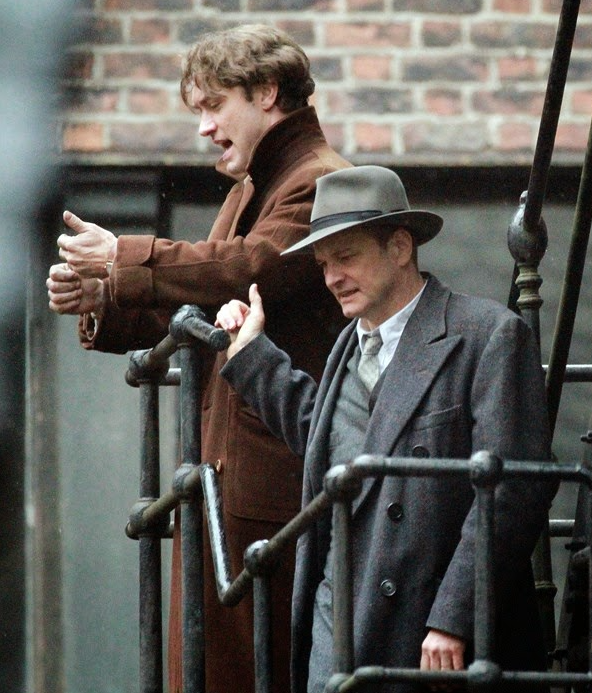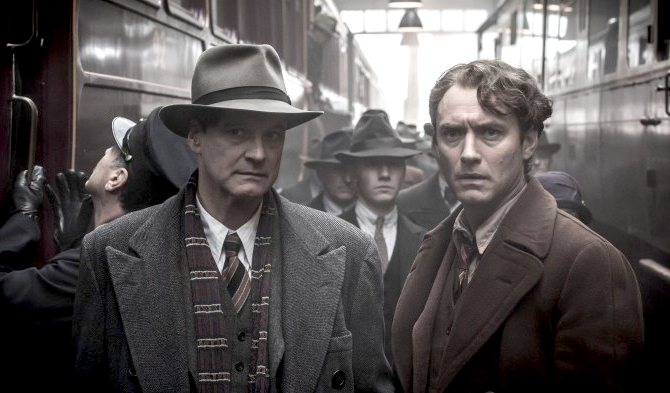
Berlinale is known for inviting one or two Hollywood pictures to the festival every year to add glamour to the sprawling selection of mostly arthouse curios. One of those films in this year’s edition was Michael Grandage’s first feature as a director, Genius. A period piece based on a true story, the film came to the festival with high expectations, given the distribution deal with Lionsgate already in place, and the pedigree of everyone involved, including thrice Oscar-nominated screenwriter John Logan, and Oscar winners Colin Firth and Nicole Kidman in the cast. But this was all before the film was screened and faced walkouts and unintentional laughs.
Maxwell Perkins (Firth) was the editor and invisible hand behind some of the biggest American masterpieces of literature in the 1920s, including novels by Ernest Hemingway (Dominic West) and F. Scott Fitzgerald (Guy Pierece). Perkins is a family man, living in an expansive estate with his wife Louise (Laura Linney) and five daughters. As one would expect of the editor responsible for taming wild characters such as Hemingway and, eventually, Thomas Wolfe (Jude Law), Perkins is a gentleman of the highest order, calm and gentle, but serious all the same. [More...]
Perkins' straight manner is reflected in his perfectly tailored suits, a fact that the film cares to repeatedly emphasize several times early on as he gets on or off the train in New York City, within a generic, dull set-up that has appeared in many other period films in New York: steam in the air in the train stations, crowds of men walking in long shots all looking the same in dapper suits.
Genius is filled with these familiar visual cues. In fact, it is hardly possible to envision a film less enticing or uninspired than this in its visual construct. The only stylistic decision that doesn’t appear entirely borrowed from a slew of similar films is the faded out colour palette and the intensely bright lighting, both of which work to the film's detriment. Though the unfortunately titled Genius is about an author influenced by jazz music, is set in the 1920s New York City and contains repeated references to ‘The Great Gatsby’, it is curious that the first words that come to mind about the film are "dreary" and "anemic".
Wolfe’s massive manuscript arrives at Perkins’s office after all major publishers reject it out of hand. Perkins sees the value in the text and begins the process of shaping the book into coherence. With the success of this book, ‘Look Homeward, Angel’, Wolfe becomes even bolder, turning a manuscript so large that several men have to carry the boxes into Perkins’s office. But as Tom and Max spend more time at the editor's room, entangled in the years-long process of reshaping this second novel, both men become distant from their homes, a fact that puts significant strain on their personal lives. While Max finds it difficult to come to terms with the turn of events, Tom plunges deeper into his writing and becomes increasingly cruel.
 To portray Wolfe’s brash cockiness, Law decides to play the character with as much physical enthusiasm as he can muster; and he has arguably never been so awful in any film before. Overplaying the character’s animated demeanour and manic energy to the point of caricature, Law’s outlandish, hammy performance falls into a repetitive rhythm from which he can never escape after the first scene. Yet, Law delivers the worst performance in the film only by the smallest of margins, for there is also Nicole Kidman. It is reasonable to point out that Logan’s screenplay treats her character – stage designer Aline Bernstein, who has left husband and family to be with Wolfe – so poorly that it becomes virtually impossible to deliver a performance resembling anything other than parody, but it is still Kidman who wins the film’s loudest unintentional laugh as Aline pulls out a gun in what is meant to be one of the most intense moments in the movie. One can describe Aline’s jealousy about Tom’s admiration for Max as, at best, irrational and, at worst, crazed; nevertheless, it’s a grossly misogynistic depiction that is not helped by Kidman’s tone-deaf performance.
To portray Wolfe’s brash cockiness, Law decides to play the character with as much physical enthusiasm as he can muster; and he has arguably never been so awful in any film before. Overplaying the character’s animated demeanour and manic energy to the point of caricature, Law’s outlandish, hammy performance falls into a repetitive rhythm from which he can never escape after the first scene. Yet, Law delivers the worst performance in the film only by the smallest of margins, for there is also Nicole Kidman. It is reasonable to point out that Logan’s screenplay treats her character – stage designer Aline Bernstein, who has left husband and family to be with Wolfe – so poorly that it becomes virtually impossible to deliver a performance resembling anything other than parody, but it is still Kidman who wins the film’s loudest unintentional laugh as Aline pulls out a gun in what is meant to be one of the most intense moments in the movie. One can describe Aline’s jealousy about Tom’s admiration for Max as, at best, irrational and, at worst, crazed; nevertheless, it’s a grossly misogynistic depiction that is not helped by Kidman’s tone-deaf performance.
In the end, only Colin Firth escapes this mess with any measure of dignity, with a poised performance that, while similar to many of his previous works, is at least significantly superior to everything going on around him. If there is one thing Genius can take solace in, it’s the benevolence of the festival’s programmers who have managed to find another prestige picture so bad, it makes Grandage’s film look like an artistic triumph, but we’ll get to that one tomorrow.

Previous Berlinale Reviews: L'Avenir, Being 17, Fire At Sea, Hedi and Midnight Special
